Sunday, June 5, 2005
Cold, dry and lifeless - a new take on Mars
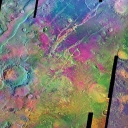 NewScientist: “New research on a green mineral that degrades easily in water and is present over much of the Martian surface is fuelling debates over the history of water and the current existence of life on the Red planet.”
NewScientist: “New research on a green mineral that degrades easily in water and is present over much of the Martian surface is fuelling debates over the history of water and the current existence of life on the Red planet.”
Posted by Oleg Ivrii, 11:59 AM / Comments (0)
Thursday, May 19, 2005
Star's erratic conduct hides predictable nature
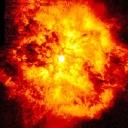 Maggie McKee reports for NewScientist: “A massive star known for violent and erratic behaviour shows a surprisingly predictable and regular pattern in brightness, reveals the most detailed study ever done on the star. But the clockwork signal has stumped astronomers, who hope to unravel how other such stars sow the universe with heavy elements.”
Maggie McKee reports for NewScientist: “A massive star known for violent and erratic behaviour shows a surprisingly predictable and regular pattern in brightness, reveals the most detailed study ever done on the star. But the clockwork signal has stumped astronomers, who hope to unravel how other such stars sow the universe with heavy elements.”
Posted by Oleg Ivrii, 06:15 PM / Comments (0)
Monday, May 16, 2005
Densest materials known made to float on air
Maggie McKee reports for NewScientist: “The densest materials known have been made to levitate on a pool of liquid air, reveals a new study. The trick may one day be used to separate precious minerals, metal and gems from rock and soil.”
Posted by Oleg Ivrii, 10:18 PM / Comments (0)
Saturday, May 7, 2005
Saturn's Odd Moon Out
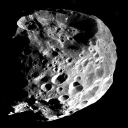 Wired News: “Scientists this week got two steps closer to proving that Saturn adopted one of its 34 known moons, thanks to two new studies of data captured by NASA’s Cassini spacecraft. The studies, which explore the density and chemistry of the moon Phoebe, show how the moon is closer in composition to the mysterious balls of ice and rock at the outer edges of the solar system than it is to Saturn’s other moons.”
Wired News: “Scientists this week got two steps closer to proving that Saturn adopted one of its 34 known moons, thanks to two new studies of data captured by NASA’s Cassini spacecraft. The studies, which explore the density and chemistry of the moon Phoebe, show how the moon is closer in composition to the mysterious balls of ice and rock at the outer edges of the solar system than it is to Saturn’s other moons.”
Posted by Oleg Ivrii, 11:44 AM / Comments (0)
Sea birds might pay for green electricity
NewScientist: “Available evidence suggests that wind farms reduce the abundance of many bird species at the wind farm site… [a]mong the worst affected are waders and ducks in shallow coastal waters. The findings could be especially significant for the UK, which has the biggest offshore wind energy programme in the world.”
Posted by Oleg Ivrii, 11:36 AM / Comments (0)
Sunday, April 17, 2005
Risk-taking boys do not get the girls
NewScientist: “Whether it’s driving too fast, bungee-jumping or reckless skateboarding, young men will try almost anything to be noticed by the opposite sex. But a study of attitudes to risk suggests that the only people impressed by their stunts are other men.”
Posted by Oleg Ivrii, 06:35 PM / Comments (0)
Friday, April 15, 2005
A Dinosaur Theory for the Birds
Wired News: “The rare discovery of eggs inside a dinosaur has given scientists new clues about the reproductive biology of the creatures and more support for the theory that birds came from dinosaurs.”
Posted by Oleg Ivrii, 08:11 PM / Comments (0)
Tuesday, March 29, 2005
Dying stars could make frozen planets habitable
Maggie McKee reports for NewScientist: “Planet hunters should look for potential havens for life around dying stars, suggest new calculations. Astronomers think the best environment for life around any star lies in a “habitable zone” – the zone in which a planet’s surface temperature means liquid water can exist.”
Posted by Oleg Ivrii, 08:02 PM / Comments (0)
Wednesday, March 23, 2005
Mendel's Law May Be Flawed
Wired News: “Challenging a scientific law of inheritance that has stood for 150 years, scientists say plants sometimes select better bits of DNA in order to develop normally even when their predecessors carried genetic flaws.”
Posted by Oleg Ivrii, 03:13 PM / Comments (0)
Monday, March 21, 2005
Classic maths puzzle cracked at last
Maggie McKee reports for NewScientist: “A number puzzle originating in the work of self-taught maths genius Srinivasa Ramanujan nearly a century ago has been solved. The solution may one day lead to advances in particle physics and computer security.”
Posted by Oleg Ivrii, 03:06 PM / Comments (0)
Thursday, March 17, 2005
Watery atmosphere discovered on Saturn's moon
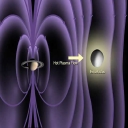 Maggie McKee reports for NewScientist: “Saturn’s snow-white moon, Enceladus, is shrouded by a thin water-vapour atmosphere, reveal measurements from the US-European Cassini spacecraft. The atmosphere may be pumped out by erupting ice volcanoes or geysers - which could signal toeholds for life on the tiny moon.”
Maggie McKee reports for NewScientist: “Saturn’s snow-white moon, Enceladus, is shrouded by a thin water-vapour atmosphere, reveal measurements from the US-European Cassini spacecraft. The atmosphere may be pumped out by erupting ice volcanoes or geysers - which could signal toeholds for life on the tiny moon.”
Posted by Oleg Ivrii, 04:48 PM / Comments (0)
Friday, March 11, 2005
'Red and dead' galaxies surprise astronomers
Maggie McKee reports for NewScientist: “The corpses of three “dead” galaxies - which to the surprise of astronomers stopped forming stars long ago - have been identified by the Spitzer Space Telescope during a survey of the distant, early universe. The find bolsters a theory that colossal black holes can starve galaxies of the gas needed to create new stars.”
Posted by Oleg Ivrii, 08:17 PM / Comments (0)
Monday, March 7, 2005
Laughing helps arteries and boosts blood flow
Andy Coghlan reports for NewScientist: “Laughing appears to be almost as beneficial as a workout in boosting the health of blood vessels, a new study suggests. Thirty minutes of exercise three times a week and 15 minutes of hearty laughter each day should be part of a healthy lifestyle, says Michael Miller of the University of Maryland Medical Center in Baltimore, US, whose team has shown that laughter relaxes arteries and boosts blood flow.”
Posted by Oleg Ivrii, 09:46 PM / Comments (0)
Wednesday, March 2, 2005
Hydroelectric power's dirty secret revealed
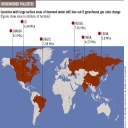 NewScientist: “Contrary to popular belief, hydroelectric power can seriously damage the climate. Proposed changes to the way countries’ climate budgets are calculated aim to take greenhouse gas emissions from hydropower reservoirs into account, but some experts worry that they will not go far enough.”
NewScientist: “Contrary to popular belief, hydroelectric power can seriously damage the climate. Proposed changes to the way countries’ climate budgets are calculated aim to take greenhouse gas emissions from hydropower reservoirs into account, but some experts worry that they will not go far enough.”
Posted by Oleg Ivrii, 07:15 AM / Comments (0)
Saturday, February 26, 2005
42nd Mersenne Prime Confirmed
Eric W. Weisstein reports for MathWorld Headline News: “The new Mersenne prime is 2^25,964,951 - 1 = 1221646300…7077247 (where the ellipses indicate that several million intervening digits have being omited for conciseness) and has a whopping total of 7,816,230 decimal digits. It is therefore not only the largest known Mersenne prime, but also the largest known prime of any kind.”
Posted by Oleg Ivrii, 07:46 PM / Comments (0)
Thursday, February 24, 2005
Astronomers claim first 'dark galaxy' find
Stuart Clark of NewScientist reports: “Strong evidence for a massive galaxy totally devoid of stars has been found in the Virgo cluster, about 50 million light years away from Earth. If the existence of this “dark galaxy” is confirmed, it will vindicate the favoured theory of how galaxies form - and will present fresh puzzles to solve.”
Posted by Oleg Ivrii, 08:47 PM / Comments (0)
Friday, February 18, 2005
The Brightest Blast
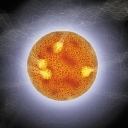 Sky and Telescope: “On December 27, 2004, more than a dozen spacecraft recorded the brightest event from outside the solar system ever observed in the history of astronomy. The spacecraft, which included Earth-orbiting satellites as well as interplanetary probes such as Cassini, Mars Odyssey, and Ulysses, picked up a powerful burst of gamma rays and X-rays from one of the most exotic beasts in the galactic zoo: a magnetar. These bizarre objects are neutron stars possessing magnetic fields a million billion times more powerful than Earth’s field, or some 1,000 times greater that those of normal neutron stars.”
Sky and Telescope: “On December 27, 2004, more than a dozen spacecraft recorded the brightest event from outside the solar system ever observed in the history of astronomy. The spacecraft, which included Earth-orbiting satellites as well as interplanetary probes such as Cassini, Mars Odyssey, and Ulysses, picked up a powerful burst of gamma rays and X-rays from one of the most exotic beasts in the galactic zoo: a magnetar. These bizarre objects are neutron stars possessing magnetic fields a million billion times more powerful than Earth’s field, or some 1,000 times greater that those of normal neutron stars.”
Posted by Arash Joushaghani, 07:58 PM / Comments (0)
42nd Mersenne Prime (Probably) Discovered
Eric W. Weisstein reports for MathWorld Headline News: “A new Mersenne number has been flagged as prime and reported to the project’s server. If verified, this would be the 42nd known Mersenne prime, as well as the largest prime number known of any kind.”
Posted by Oleg Ivrii, 04:58 PM / Comments (0)
Thursday, February 17, 2005
Math skills evolved independent of language
NewScientist: “Noam Chomsky’s theory that the evolution of language provided the portal to all higher thought has taken another knock. A study of people with language difficulties suggests that mathematical skill evolved independently.”
Posted by Oleg Ivrii, 06:06 PM / Comments (0)
Saturday, February 12, 2005
Attack of the Metal-Eating Plants
From Wired News Technology: “Genetically modified plants may be the green solution for cleaning up contaminated soils.”
Posted by Oleg Ivrii, 11:29 PM / Comments (0)